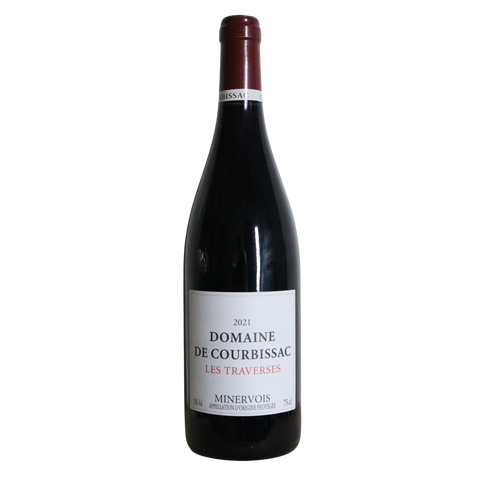
2021 Domaine de Courbissac "Les Traverses" Minervois, Languedoc-Rousillon, France
Fresh, lively scented red and black fruits finish with a savory herbal note.
There are 3 units left in stock.
ABOUT THIS WINE
A blend of roughly equal parts Grenache, Syrah & Mourvedre, Les Traverses comes from primarily the younger vines on the property and is aged in concrete. Fermentations are natural with partial whole clusters. No pigeage or remontage.
ABOUT THIS PRODUCER
Reinhard Brundig, a successful film producer from Germany, founded Domaine de Courbissac in 2002. What drew him to this property located in the La Livinière sub-zone of Minervois was three-fold: established and well-tended vines, the complexity of the soils, and the proximity to La Montagne Noire. At the heart of Domaine de Courbissac are 90-year-old Grenache, 70-year-old Carignan, and 70-year-old Cinsault, as well as some solidly middle-aged Syrah and Mourvedre around 40 years-old. Farmed biodynamically since 2002, Reinhard has expanded the size of the vineyards, now totaling 30 hectares, by planting some additional Syrah, Grenache, and Mourvèdre. At the end of 2013, Reinhard partnered with the talented Brunnhilde Claux, a young vigneronne with an impressive resumé. Brunnhilde got her start at Domaine Gauby, where she learned how to handle the natural exuberance of grapes grown in the generous Mediterranean climate. From there, she moved on to Terroir al Limit in the Priorat, where she worked with Dominik Huber for three vintages before Reinhard tapped her to lead Domaine de Courbissac.
With vineyards ranging from 250 to 450 meters above sea level, Domaine de Courbissac benefits from its location near La Montagne Noire, the southern edge of the Massif Central, and the terminus of the Cévennes. At the far western border of the Languedoc, Minervois has a semi-Mediterranean climate, especially as you approach the appellation’s northern boundary. While the growing season is warm and dry – as the wide, rocky, and parched local river beds can attest – winters typically bring plenty of precipitation to recharge the soils and sustain the vines throughout the growing season. Daytime temperatures in summer are moderated by the mountains’ influence, allowing the grapes to reach ripeness in sync with their physiological maturity. This allows for not only freshness and balance but makes whole cluster fermentations possible. The primary soil of the region is clay-limestone, which was laid down millions of years ago. This terroir is fractured with gravel and sandstone bands – glacial debris and outwash from the mountains to the north. The heavier clay soils benefit Grenache, Mourvèdre, and Carignan, while the rockier, lighter sandstone soils are perfect for producing high-toned and vibrant Syrah.
With her training and experience making wines at Domaine Gauby and Terroir al Limit, Brunnhilde takes a decidedly hands-off approach at Domaine de Courbissac. She has continued the biodynamic farming practices instituted in 2002, and she harvests each plot and variety separately and manually. The grapes are transported in small bins where they are sorted at the winery. The younger vine fruit is usually destemmed, while older vine fruit is left mostly intact. Fermentations are in concrete vats and well-seasoned, open-top wooden fermenters. If Brunnhilde is fermenting with whole clusters, she will gently layer the fruit in the vat and by foot, press out any air between the bunches. This process releases a small amount of juice, and once the vat is full, she covers it and leaves it to ferment with the natural yeasts present on the grape skins. After 9-12 days of maceration, she presses the wine. Fermentation finishes in the respective aging vessels– mainly 40hl foudres. Unless necessary, SO2 is not used until right before bottling.
